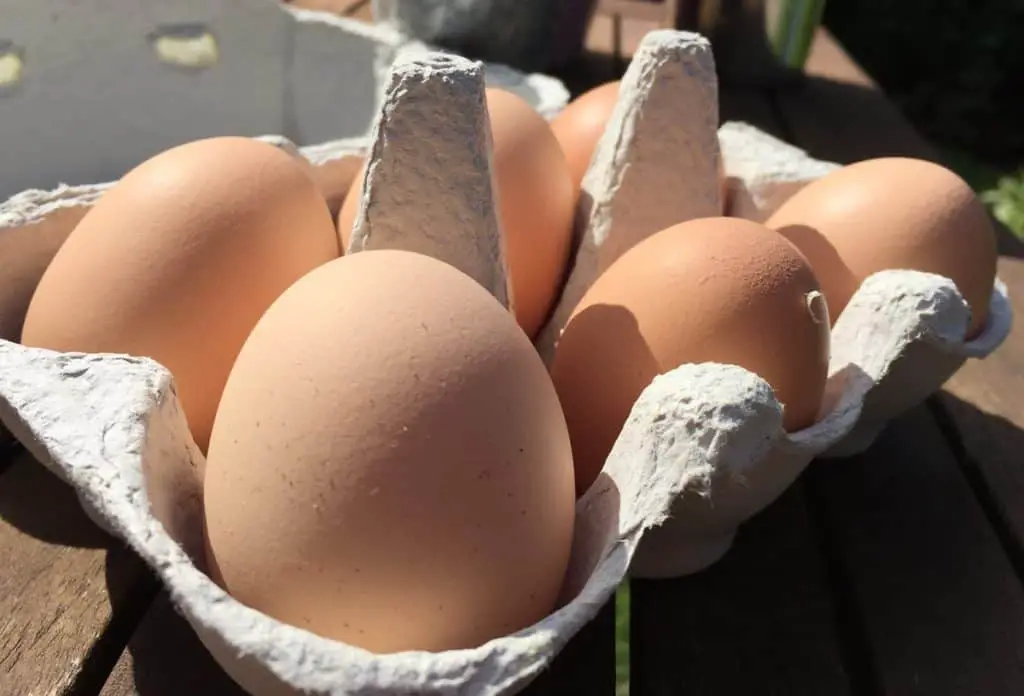Laying eggs should not harm or affect the health of the chickens. This is how chickens are supposed to keep their species and population growth. But do eggs harm chickens?
The process of laying eggs in chickens, under natural circumstances, is generally not harmful and should not cause significant pain. Chickens are biologically designed to lay eggs, and this process is a normal part of their reproductive cycle. However, the degree of discomfort or pain can vary depending on several factors, including the breed of the chicken, the size of the egg, and the individual chicken’s health and condition.
In commercial farming settings where chickens are bred to lay a higher number of eggs than they naturally would, the stress on their bodies can potentially lead to health issues. Overproduction of eggs can result in calcium deficiencies, leading to weaker bones and potentially more discomfort during laying. Additionally, conditions like egg binding, where an egg gets stuck in the oviduct, can cause significant distress and pain, requiring immediate veterinary care.
Here’s a condensed version of the key points, aimed at clarifying and enhancing the narrative:
- Natural Reproduction vs. Commercial Practices: Chickens, in their natural habitat or as backyard pets, lay eggs as part of their reproductive cycle, which should not inherently harm them. However, commercial practices have significantly altered this natural process, prioritizing productivity over the health and comfort of the chickens.
- Genetic Modifications and Commercial Farming: The breeding of chickens to lay an unnaturally high number of eggs annually is a primary concern. These practices can strain the chickens’ bodies due to the constant demand for nutrients required for egg production, particularly calcium for eggshells, which is sourced from the chicken’s body reserves.
- Health Implications: The shift from a chicken’s natural egg-laying frequency (10 to 16 eggs per year in the wild) to the commercial expectation (200 to 300 eggs per year) raises questions about the impact on their health. This intense laying schedule, often without adequate nutritional support, can lead to various health issues.
- Pain and Distress: While the act of laying an egg is not abnormal for a chicken, the conditions under which many commercial laying hens live can cause distress and discomfort. The lack of space, constant exposure to artificial lighting, and inadequate nutrition all contribute to a less-than-ideal environment for these animals.
- Ethical Considerations and Consumer Impact: The conditions in which chickens are raised for egg production not only affect their health but may also have implications for consumers. The push towards more ethical housing and chicken-keeping practices reflects a growing awareness and concern for animal welfare and the quality of the eggs produced.
- Conclusion: The health and well-being of chickens in the context of egg-laying are closely tied to their living conditions and the practices of the farms where they are raised. While backyard and wild chickens generally maintain a healthy lifestyle conducive to natural egg production, commercial farming practices often prioritize efficiency over animal welfare, leading to ethical and health-related concerns.
But somehow things are not so cut and dry. Chickens being a poultry item, they are reared for their meat and eggs. And over the past century, a lot has changed for the chickens as a species.
Today, we have genetically modified chicken breeds that are grown in thousands in as many chicken farms all over the world. There is little concern for their comfort and health. All the focus is on profit and this has led farmers to raise their chickens in highly unsatisfactory environments.
Some chickens are raised for their meat while others are raised for both their eggs and meat. The chickens that are raised for eggs usually give 200 to 300 eggs per year.
Normally, chickens lay their eggs in the spring or summer seasons but these chickens in commercial farms keep laying eggs all year round with a small window of relief. Eggs are formed with the nutrients available within the body of the chickens. For example, the eggshells are pure calcium that must come from the body of the chickens.
Now, it is anybody’s guess how much nutrients commercial chicken farms feed to their chickens to make them lay 200 to 300 eggs per year. Naturally, they don’t have so many nutrients but biologically their bodies are programmed to lay eggs in those excessive numbers.
This must be extremely harsh on their bodies and this kind of egg-laying must affect and harm the health of the chickens.
In this light, it should be interesting and pertinent to note the number of eggs that chickens lay naturally in the wild. Chickens like any other living species on the planet Earth have a natural method of reproduction to keep their population growing.
In the wild, chickens are known to lay 10 to 16 eggs per year. They lay eggs twice a year and the number of eggs per reproduction cycle is 5 to 8. This is when they have the best of the foods available and there is no shortage of mating partners.
Now, if you compare the number of eggs chickens lay in normal circumstances and in commercial farms, you can have a feel of what’s wrong with the egg-laying story. How are chickens able to lay so many eggs on commercial farms?
They can do so because they are fed artificial nutrients that are geared to make them lay more eggs or grow in weight rather too soon. All these supplements in the body of the chickens are not good news for the consumers, who may be the end recipients of all that the chickens are fed.
Chances are besides hurting the health of the chickens, unethical practices in commercial chicken farms may be hurting the health of unsuspecting consumers.

Is It Painful For the Chicken?
Do eggs harm chickens? Chickens laying eggs is a routine aspect of their reproduction system. It should not be particularly painful but it’s not completely normal either. Chickens use a 26-hour time cycle to reproduce the eggs during their egg-laying season.
They also need at least 12 hours of daylight to stimulate the hormones responsible for triggering egg formation in the chicken’s body. Two hours after laying the egg, the chicken’s body begins the process of forming the next egg. The egg is formed with the nutrients available within the body.
Look at an eggshell, this entire outer cover is made with calcium drawn from the chicken’s body. When so much is happening within the chicken’s body, it cannot be said to be completely normal.
The chicken may not be exhibiting too many signs of distress, but she must be feeling what all is happening to her. The final act of exiting the egg through the vent may not be extremely painful but the chicken must be feeling some degree of distress or pain. But this is common to all birds, animals, and even humans. A little pain is part of the reproduction process.
But we also know that distress and pain can be reduced to a large extent by following an active lifestyle marked with physical labor. Chickens living in the wild or backyard chickens that have all the freedom of going about their lives all day long must have much pain associated with egg-laying managed through physical mobility.
But this is not true for commercial farms where chickens are kept in cages where they don’t have space even to move or turn.
Does Egg-Laying Affect the Chicken’s Health?
There are different kinds of chickens these days and it depends on which kind of chicken we are talking about. If we are talking about chicken farms where they are supposed to lay 200 to 300 eggs per year, we are naturally not as concerned about their health as we are about their productivity.
Then we have backyard chicken breeds that are obtained by selective breeding. Their breed is optimized for laying more eggs.
Do eggs harm chickens? They live in your backyard and have a natural, caring, and loving environment. They feed on the food waste from your home and insects in your garden. They have a normal and protected life. They lay their eggs in a natural way and as many their body wishes. For these hens, egg-laying would not affect their health.
It is part of their natural reproduction. The story of chickens in the wild is almost similar to backyard chickens as they too don’t have the pressure to produce more eggs. In the wild, they have more nutritious food and they have enough roosters as well for mating. So, even their health is not impacted by the egg-laying process.
Whenever we talk about chicken’s health or egg-laying affecting their bodies, we generally talk about commercial chicken farms where the motive of profit and superiority of science and technology are taking a serious toll on the birds raised there.

What Are Ethical Housing and Chicken-Keeping?
Naturally, all the discussions about chicken’s health and their overstretched egg-laying capacity are about commercial chicken farms. These issues are now shaking the conscience of the people and they are demanding a more ethical treatment to the poultry birds.
That’s how the concept of ethical housing or ethical chicken keeping has come to the fore.
Looking at the sorry state of chickens and the condition in which they are made to lay a huge number of eggs, the trend of raising chickens in one’s backyard has picked up all over the world. These chickens grow in the loving and caring environment of a home and are kept in a more comfortable and hygienic environment.
They have a happy life roaming around freely along with their chicks. These chickens are a source of healthy and organic animal protein.
Meanwhile, poultry associations have also woken up to the pitiable condition in which the chickens are forced to live and lay eggs in commercial farms. These trade bodies are now putting down codes to self-regulate the industry and prepare a charter of best practices. In the rush of things, nobody seems to have the time to look at how exactly and in what conditions the chickens are forced to live in commercial farms.
Thanks to many NGOs, the exact problems have been highlighted such as lack of space to even move, incisions and wounds due to the cage fencing and overcrowding, lack of access to water and feed in an overcrowded enclosure, and too much light from electric bulbs all the time are some common problems.
In ethical housing or ethical chicken keeping, these issues need to be tackled on a priority basis.
Does It Harm the Chicken If You Remove and Eat the Eggs?
Eggs are one of the most delicious foods. But how does the chicken feel about humans eating their eggs? Does it also harm them? Well, there can be many answers to this but the most insightful one will look at how the eggs come into being and how the chicken relates to them.
A chicken starts laying eggs at the age of about 4 months. Chickens’ bodies are biologically programmed to produce unfertilized eggs. It’s during the process of egg formation, if the chicken is able to mate with a rooster, the egg has a chance to fertilize.
Otherwise, the chicken will produce an unfertilized egg that will not give birth to a chick. Even fertilized eggs won’t give birth to a chick if the chicken does not brood over it for a fortnight.
Now removing eggs at this stage for your kitchen is something that we all have been doing for centuries. And, the chickens seem to have come to accept this as part of a natural interdependence of species. It’s no different from trees giving fruits or some plants giving vegetables.
Even humans don’t eat all the eggs and leave behind some for the chickens to continue to have their families.
Final Thoughts
The egg-laying process is a natural phenomenon and it does not affect the health of chickens. This, we are talking about backyard chickens and chickens in the wild. The situation in commercial chicken farms is far from being satisfactory.
That’s why there is a growing call for ethical housing or ethical chicken keeping.


